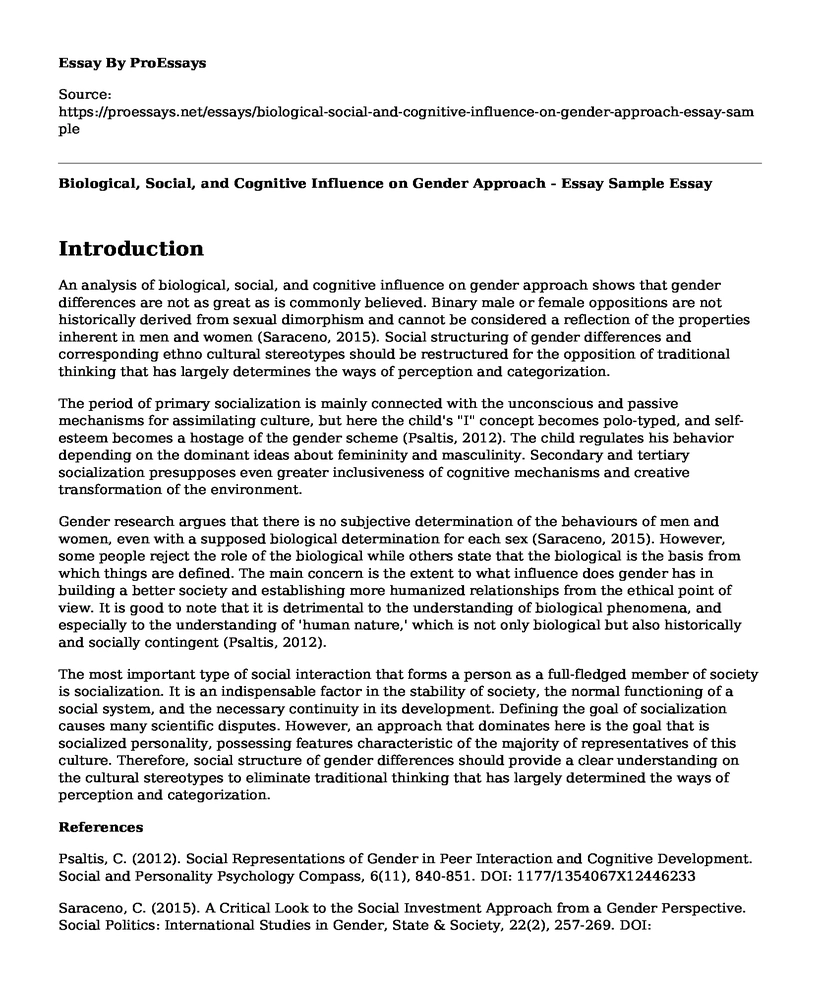Introduction
An analysis of biological, social, and cognitive influence on gender approach shows that gender differences are not as great as is commonly believed. Binary male or female oppositions are not historically derived from sexual dimorphism and cannot be considered a reflection of the properties inherent in men and women (Saraceno, 2015). Social structuring of gender differences and corresponding ethno cultural stereotypes should be restructured for the opposition of traditional thinking that has largely determines the ways of perception and categorization.
The period of primary socialization is mainly connected with the unconscious and passive mechanisms for assimilating culture, but here the child's "I" concept becomes polo-typed, and self-esteem becomes a hostage of the gender scheme (Psaltis, 2012). The child regulates his behavior depending on the dominant ideas about femininity and masculinity. Secondary and tertiary socialization presupposes even greater inclusiveness of cognitive mechanisms and creative transformation of the environment.
Gender research argues that there is no subjective determination of the behaviours of men and women, even with a supposed biological determination for each sex (Saraceno, 2015). However, some people reject the role of the biological while others state that the biological is the basis from which things are defined. The main concern is the extent to what influence does gender has in building a better society and establishing more humanized relationships from the ethical point of view. It is good to note that it is detrimental to the understanding of biological phenomena, and especially to the understanding of 'human nature,' which is not only biological but also historically and socially contingent (Psaltis, 2012).
The most important type of social interaction that forms a person as a full-fledged member of society is socialization. It is an indispensable factor in the stability of society, the normal functioning of a social system, and the necessary continuity in its development. Defining the goal of socialization causes many scientific disputes. However, an approach that dominates here is the goal that is socialized personality, possessing features characteristic of the majority of representatives of this culture. Therefore, social structure of gender differences should provide a clear understanding on the cultural stereotypes to eliminate traditional thinking that has largely determined the ways of perception and categorization.
References
Psaltis, C. (2012). Social Representations of Gender in Peer Interaction and Cognitive Development. Social and Personality Psychology Compass, 6(11), 840-851. DOI: 1177/1354067X12446233
Saraceno, C. (2015). A Critical Look to the Social Investment Approach from a Gender Perspective. Social Politics: International Studies in Gender, State & Society, 22(2), 257-269. DOI: https://doi.org/10.1093/sp/jxv008
Cite this page
Biological, Social, and Cognitive Influence on Gender Approach - Essay Sample. (2022, Dec 19). Retrieved from https://proessays.net/essays/biological-social-and-cognitive-influence-on-gender-approach-essay-sample
If you are the original author of this essay and no longer wish to have it published on the ProEssays website, please click below to request its removal:
- Paper Example on Economic Inequality in Cambodia
- Ways That Technology Has Changed the Way We Share Information Essay
- Communication Strategy of Nike Inc Paper Example
- Avoiding Violence Between Police and Citizens - Essay Sample
- Research Paper on Mafia: Organized Crime vs Coordinated Crimes
- Essay Example on Technology Addiction: How Far Is Too Far?
- Free Essay Sample: Effects of Racism in the Sport Industry







